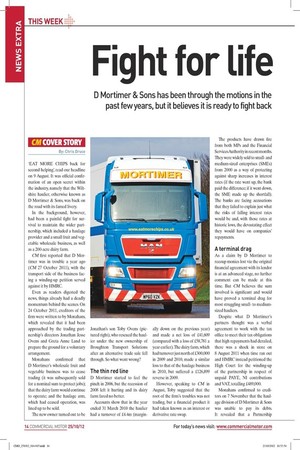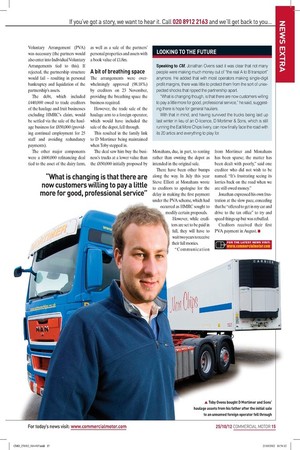Fight for life
Page 10

Page 11

If you've noticed an error in this article please click here to report it so we can fix it.
D Mortimer & Sons has been through the motions in the past few years, but it believes it is ready to fight back
By: Chris Druce
‘EAT MORE CHIPS back for second helping’, read our headline on 9 August. It was official confirmation of an open secret within the industry, namely that the Wiltshire haulier, otherwise known as D Mortimer & Sons, was back on the road with its famed livery.
In the background, however, had been a painful fight for survival to maintain the wider partnership, which included a haulage provider and a small fruit and vegetable wholesale business, as well as a 200-acre dairy farm.
CM first reported that D Mortimer was in trouble a year ago (CM 27 October 2011), with the transport side of the business facing a winding-up petition served against it by HMRC.
Even as readers digested the news, things already had a deadly momentum behind the scenes. On 24 October 2011, creditors of the firm were written to by Monahans, which revealed that it had been approached by the trading partnership’s directors Jonathan Jesse Ovens and Greta Anne Land to prepare the ground for a voluntary arrangement.
Monahans confirmed that D Mortimer’s wholesale fruit and vegetable business was to cease trading (it was subsequently sold for a nominal sum to protect jobs); that the dairy farm would continue to operate; and the haulage arm, which had ceased operation, was lined up to be sold.
The new owner turned out to be Jonathan’s son Toby Ovens (pictured right), who rescued the haulier under the new ownership of Broughton Transport Solutions after an alternative trade sale fell through. So what went wrong?
The thin red line
D Mortimer started to feel the pinch in 2006, but the recession of 2008 left it hurting and its dairy farm fared no better.
Accounts show that in the year ended 31 March 2010 the haulier had a turnover of £4.4m (margin ally down on the previous year) and made a net loss of £41,609 (compared with a loss of £58,781 a year earlier). The dairy farm, which had turnover just north of £300,000 in 2009 and 2010, made a similar loss to that of the haulage business in 2010, but suffered a £126,899 reverse in 2009.
However, speaking to CM in August, Toby suggested that the root of the firm’s troubles was not trading, but a financial product it had taken known as an interest or derivative rate swap. The products have drawn fire from both MPs and the Financial Services Authority in recent months. They were widely sold to smalland medium-sized enterprises (SMEs) from 2000 as a way of protecting against sharp increases in interest rates (if the rate went up, the bank paid the difference; if it went down, the SME made up the shortfall). The banks are facing accusations that they failed to explain just what the risks of falling interest rates would be and, with those rates at historic lows, the devastating effect they would have on companies’ repayments.
A terminal drag
As a claim by D Mortimer to recoup monies lost via the original financial agreement with its lendor is at an advanced stage, no further comment can be made at this time. But CM believes the sum involved is significant and would have proved a terminal drag for most struggling smallto mediumsized hauliers.
Despite what D Mortimer’s partners thought was a verbal agreement to work with the tax office to meet their tax obligations that high repayments had derailed, there was a shock in store on 8 August 2011 when time ran out and HMRC instead petitioned the High Court for the winding-up of the partnership in respect of unpaid PAYE, NI contributions and VAT, totalling £489,000.
Monahans confirmed to creditors on 7 November that the haulage division of D Mortimer & Sons was unable to pay its debts. It revealed that a Partnership Voluntary Arrangement (PVA) was necessary (the partners would also enter into Individual Voluntary Arrangements tied to this). If rejected, the partnership structure would fail – resulting in personal bankruptcy and liquidation of the partnership’s assets.
The debt, which included £440,000 owed to trade creditors of the haulage and fruit businesses excluding HMRC’s claim, would be settled via the sale of the haulage business for £850,000 (providing continual employment for 25 staff and avoiding redundancy payments).
The other major components were a £600,000 refinancing deal tied to the asset of the dairy farm, as well as a sale of the partners’ personal properties and assets with a book value of £1.8m.
A bit of breathing space The arrangements were overwhelmingly approved (98.18%) by creditors on 23 November, providing the breathing space the business required.
However, the trade sale of the haulage arm to a foreign operator, which would have included the sale of the depot, fell through.
This resulted in the family link to D Mortimer being maintained when Toby stepped in.
The deal saw him buy the business’s trucks at a lower value than the £850,000 initially proposed by Monahans, due, in part, to renting rather than owning the depot as intended in the original sale.
There have been other bumps along the way. In July this year Steve Elliott at Monahans wrote to creditors to apologise for the delay in making the first payment under the PVA scheme, which had occurred as HMRC sought to modify certain proposals.
However, while credi tors are set to be paid in full, they will have to wait two years to receive their full monies.
“Communication from Mortimer and Monahans has been sparse; the matter has been dealt with poorly,” said one creditor who did not wish to be named. “It’s frustrating seeing its lorries back on the road when we are still owed money.” Jonathan expressed his own frustration at the slow pace, conceding that he “offered to get in my car and drive to the tax office” to try and speed things up but was rebuffed.
Creditors received their first PVA payment in August. ■












































